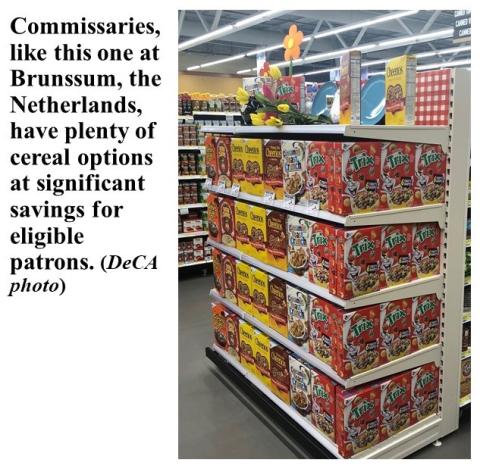MINUTE OF HISTORY: From troop rations to commissary shelves, cereal has proved to be a popular breakfast option for the military

NOTE: To see a DeCA video related to this release, click here.
FORT LEE, Va. – The United States has been producing ready-made cereals for over 130 years. As cereals gained popularity in commercial grocery stores, they also proved to be a beloved breakfast option for the military in troop rations and commissary shelves.
There are so many different kinds of cereals for service members and their families to choose from at their local commissary – dry cold cereal or hot cereals, either instant or cooked, said Marine Sgt. Maj. Michael R. Saucedo, senior enlisted advisor to the Defense Commissary Agency (DeCA) director.
“When you’re in the field you appreciate those special treats in your rations, and cereals have always been that bonus for us,” Saucedo said. “Back in garrison, we want service members and their families to know if they’re not buying their cereal in their commissary, they’re missing out on overall savings of at least 25 percent compared to prices at ‘outside the gate’ grocery stores – that means savings of at least $50 on a $200 grocery bill!”
So, what’s the story behind cereal and the U.S. military?
During the American Civil War, 1861-1865, Schumacher’s Oats were a mainstay for the troops. More than 50 years later during World War I, little had changed as oatmeal and cream of wheat remained popular.
During World War II, some government nutritionists teamed up with several American cereal companies and began adding dry cereal to the B Unit ration kits of soldiers. Of course, these rations didn’t contain the sugar sparkles or prizes found in many popular children’s cereals. However, they did have a mixture of oats, rice and wheat cereal in a small brown package.
By the Vietnam War, the military B-4 ration can also had dry cereal. Today, military MREs also contain dry cereal and the dining facilities serve individual-sized cereals on their breakfast line.
And if it’s about making nutritious choices and saving money on cereal, Saucedo encourages service members and their families to shop their commissary.
“If you purchase the right kind of cereal, it can be a good way to start your day,” Saucedo said. “And, if you bought that cereal at your local commissary, you’ve purchased a popular breakfast treat at the best possible savings.”
-DeCA-
About DeCA: The Defense Commissary Agency operates a worldwide chain of commissaries providing groceries to military personnel, retirees and their families in a safe and secure shopping environment. Commissaries provide a military benefit, saving authorized patrons thousands of dollars annually on their purchases compared to similar products at commercial retailers. The discounted prices include a 5-percent surcharge, which covers the costs of building new commissaries and modernizing existing ones. A core military family support element, and a valued part of military pay and benefits, commissaries contribute to family readiness, enhance the quality of life for America’s military and their families, and help recruit and retain the best and brightest men and women to serve their country.
